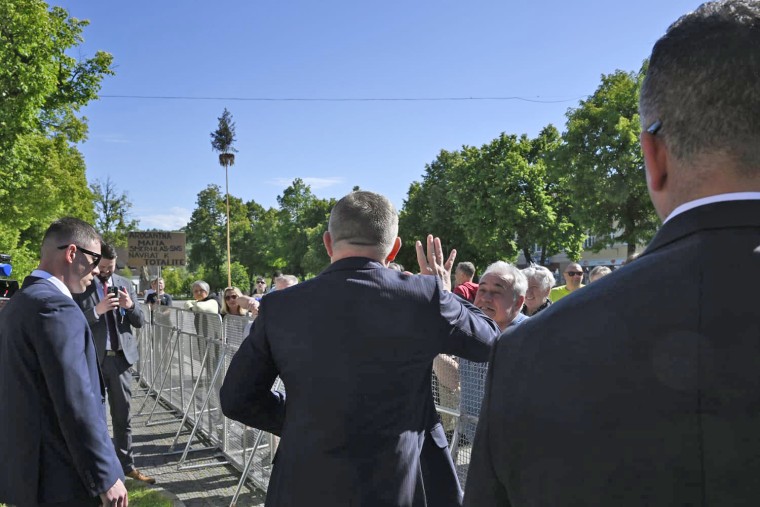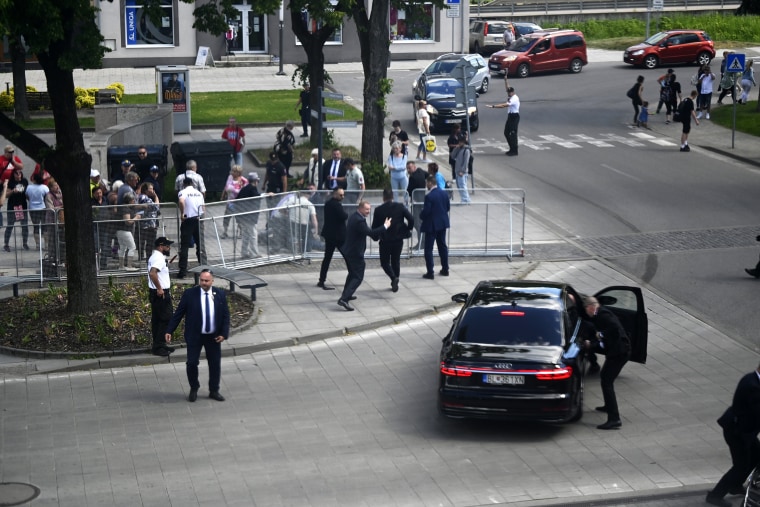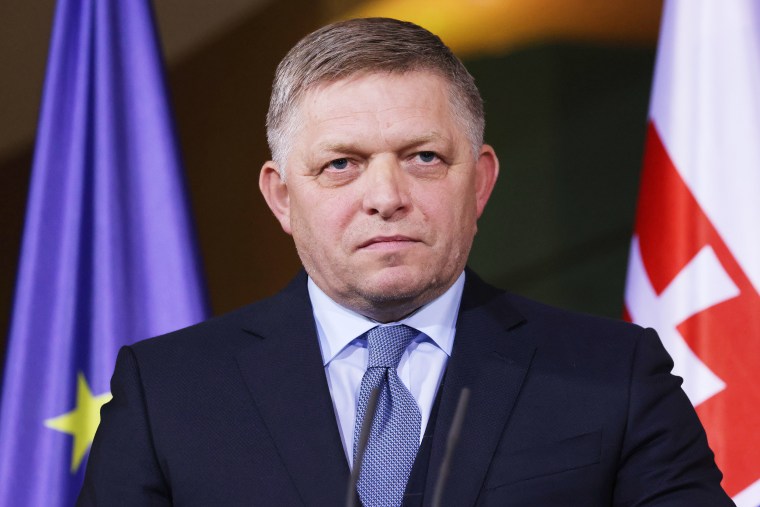Slovakia's populist prime minister was in "very serious" condition, officials said Thursday, after being shot multiple times in an attempted assassination that sent shock waves across the small central European country and the broader continent.
A suspect described as a "lone wolf" who had taken part in anti-government protests was charged with attempted murder as leaders urged calm.
But while Robert Fico's condition had stabilized, the incident left Europe to confront what appeared to be a rare outbreak of political violence in a region increasingly polarized by intense divisions.
Fico was rushed to a hospital and was "fighting for his life" Wednesday after he was shot multiple times in a town northeast of the capital, Bratislava, in what his party said was an "attempted assassination."
By Thursday morning, Fico's condition appeared to have improved after hours of surgery. “His condition is stabilized but is truly very serious, he will be in the intensive care unit,” said Miriam Lapunikova, director of the F.D. Roosevelt University Hospital in Banska Bystrica, where Fico was rushed after being shot while greeting the public following a government meeting.
A precise motive in Wednesday’s shooting remains unclear, but Slovakian Interior Minister Matúš Šutaj Eštok said an initial investigation had found a “clear political motivation.” On Thursday, however, he described the suspect as a lone wolf who “did not belong to any political groups.”
He said the suspect had been charged with attempted murder. The country's state broadcaster reported that he was a senior citizen and amateur writer who had published poetry and novels.
Fico has long been a divisive but dominant figure in Slovakia. He served as prime minister for longer than any other leader in the country, and returned to power after his leftist-populist Smer party won an election last September on a pro-Russia and anti-America platform.
Fico's government has drawn criticism from within the European Union, of which he is a staunch critic, for his stance on the war in Ukraine. And at home, opposition parties have led mass protests over issues including corruption and plans to take control of public media.

The main opposition party canceled a planned protest and condemned the shooting, while calling on "all politicians to refrain from any expressions and steps which could contribute to further increasing the tension.”
Slovakia’s outgoing and next presidents — political opponents — appeared together Thursday morning in a joint appeal for Slovaks to overcome their political differences.
Outgoing President Zuzana Čaputová, a political rival of Fico, said leaders of the country’s political parties would meet in a bid to bring calm and come together to “refuse violence.”
“Let us step out of the vicious circle of hatred and mutual accusations,” she said at a news conference in Bratislava. “What happened yesterday was an individual act. But the tense atmosphere of hatred was our collective work.”
President-Elect Peter Pellegrini, a close Fico ally, urged against “stand-offs and mutual accusations between politicians.”
“If there is anything that the people of Slovakia urgently need today, it is at least basic agreement and unity among the Slovak political representation. And if not consensus, then please, at least civilized ways of discussing among each other,” he said.
The attack marked the most serious attempt on the life of a European leader in decades. Elsewhere around the world, former Japanese leader Shinzo Abe was assassinated at a campaign event in July 2022.

Despite Fico's controversial status, leaders across Europe condemned the attack, while officials and analysts voiced concern that deepening political divides might be leading the continent down a dangerous path.
"I strongly condemn the vile attack on Prime Minister Robert Fico," European Commission President Ursula von der Leyen said in a post on X. "Such acts of violence have no place in our society and undermine democracy, our most precious common good," she said.
Leaders across Europe expressed similar sentiments, with both Russian President Vladimir Putin and Ukrainian President Volodymyr Zelenskyy denouncing the violence.

Political experts and pro-democracy advocates also weighed in, warning of concerns about the future of democratic discourse.
"Politicians & journalists are key pillars of our democratic systems. When they are targeted by any kind of violence or intimidation, we all lose. Democracy loses," wrote Ricardo Borges de Castro, a senior adviser to the European Policy Centre.
"We strongly condemn the attempted assassination of Slovakian Prime Minister Robert Fico and call for a swift, impartial investigation into today’s attack," the Freedom House said, just days after posting an analysis on how Fico's Smer party "posed challenges to democratic resilience."
"Such brazen political violence is completely unacceptable in any context," according to the Washington, D.C.-based nonprofit group, which Russia designated an "undesirable" organization earlier this month, effectively banning anyone from working or collaborating with it.
President Joe Biden issued a statement condemning the "horrific act of violence" and saying he and his wife were praying for Fico's recovery. The CIA declined to comment on the assassination attempt.
Wednesday's attack comes with June's European Parliament elections just weeks away.
The European Council on Foreign Relations forecast a "major shift" to the right in many countries marked by "populist radical right parties gaining votes and seats across the EU, and center-left and green parties losing votes and seats."
